'People in care aren't defined by their experiences'

Naomi Bright is hoping to come back to education after taking part in the course
- Published
“Before I went into care I didn’t really have many goals because with my home life, there was no stability."
Those are the words of 19-year-old Naomi Bright from west Belfast.
She left school with two GCSEs as, she feels, she was not pushed or motivated her in the right direction.
Now, she's one of a handful of students who have been taking part in a new short course at Ulster University (UU) which is designed to help encourage those who have had experience of early adversity attend university.

The new course at Ulster University aims to help care-experienced young people enter education
Figures from the Department of Education's annual school census for Northern Ireland for 2002-23 show that 28.7% of children in the care system stayed on in school from year 12 to year 13 compared to 64.8% for other children.
Some 73.5% of children in care left the school system with at least five GCSEs at grades A*-C (or equivalent) compared with 90.0% of other children.
Also 12.4% of children in care, who left the school system in 2022/23, were recorded as going to Higher Education and 46.8% as going to Further Education.
The figures for other children were 41.7% for Higher Education and 30.2% for Further Education.
The Early Adversity and Developmental Trauma course in UU's School of Psychology is the first course of its kind in Northern Ireland.
It aims to help attendees pursue a career in psychology, community work or social work.
'Disruption' in education
Research carried out last year by the Institute for the Study of Civil Society found care leavers are three times less likely than their non-care experienced peers to go to university.
The course's director and psychologist Dominic McSherry has conducted research in the area of child adolescent trauma.
He said the reason that children come into care is due to some form of adversity, which can harm their development and capacity to learn whenever they go to school.

Dominic McSherry says often children who come into care experience disruption
"A lot of that is to do with the fact that whenever children come into care there is a lot of disruption," he explained.
"Possibly if they come into a foster placement they will have to move school, and then maybe whenever they are in foster care they may have to move maybe one or two times," he added.
He said the constant changes can be "very disruptive" for their education.
'More support needed' for those in care

Esla Ibrahim is now hoping to re-enter education to pursue her career goals
Esla Ibrahim, 19, from north Belfast, passed her GCSEs and went into care when she was in sixth form.
She dropped out of school a few months later.
After a break, she returned to education, did her A levels at Belfast Met and is now awaiting her results.
She is also taking part in the course in the hopes of pursuing a career as a research psychologist or forensic psychologist.
She believes there needs to be more support for young people who come from a care-experienced background in education.
"I think they should be doing more for young people in showing them the importance of education and that their experiences don’t define them," she said.
"Just because their experience is a bit different than other young people who haven’t come into care, it doesn’t mean that they can’t get an education and that they aren’t smart enough," she added.
'I have goals now'
After leaving school, Naomi Bright became involved with an organisation which allowed her to gain some qualifications to get into youth work and mentoring.
She now works in youth work and plans to continue studying.
"University wouldn’t have been something I would have thought of before getting involved in this course. This course has changed that.
"Now I would. I definitely have goals now," she said.
The Department of Health said a joint strategy with the Department of Education, published in 2021, recognises the importance of education in improving life outcomes for care-experienced children and young people.
A dedicated primary age children looked after service has been put in place and work is ongoing across both departments to ensure that every child in care has an individually tailored care plan covering all aspects of their wellbeing, including their education.
Department 'committed' to removing barriers
The Adoption and Children Act in Northern Ireland was also introduced in 2022 and recognises that care-experienced children and young people often experience poorer educational outcomes than their peers.
It requires Health and Social Care trusts to promote and support the learning, development and educational achievement of children who are looked after.
Care leavers aged between 21 and 25 are also be able to apply for further assistance to pursue a new course of education or training or to request advice and support.
This advice or support may continue beyond age 25 if a health trust considers it is needed.
The Department for Economy said it was committed to removing barriers to educational and economic inclusion, recognising that care-experienced young people often face additional challenges to their peers.
Related topics
- Published1 December 2023

- Published21 June 2023
